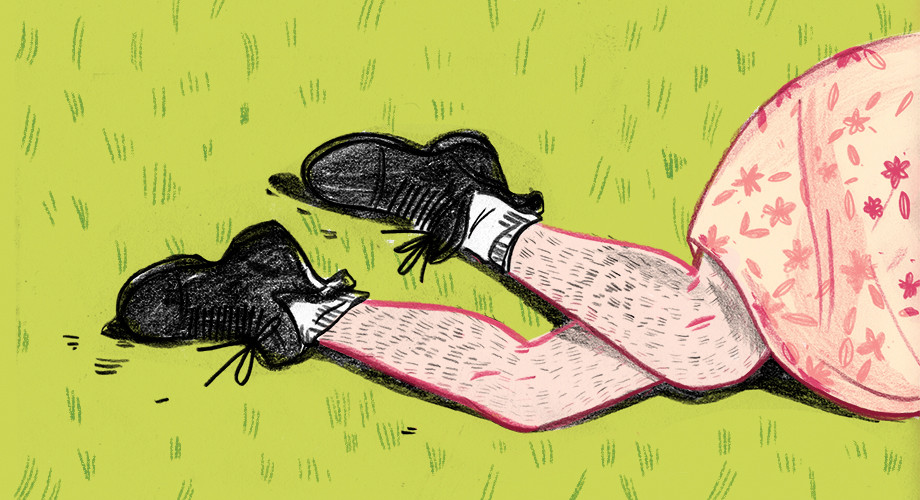Blog Series
Getting over the body hair blues: one ladydude’s manifesto

Illustration by Erin McPhee
We asked writers to share their relationship with the body hair for our upcoming alternative beauty issue. This is the first instalment in our series.
I grew up in what I assumed was the conventional way. My parents were conservative, gender lines weren’t crossed, and my mother suggested to me that I start shaving my legs about the time I began seventh grade. I wanted to fit into accepted (white, cis) feminine cultural norms as much as I was able, so starting then I regularly removed my leg hair and continued to do so throughout my teen years without much fuss.
The cuts and nicks were annoying, but the feeling of smooth legs and the thought that I successfully adhered to feminine beauty standards - that I was somehow being a girl correctly - were worth it.
I know now that the way I was raised was as arbitrary as anything else, and acknowledge that the foundation I built my very early understanding of gender upon is nowhere near universal. I don’t remember exactly when or how it happened, but I take a pretty staunch anti-hair removal stance now, at least when it comes to myself.
To expand, my true gender identity is somewhere along the ladydude spectrum: I believe in makeup’s dramatic, transformative and queer power, but I don’t wear it even close to every day. I don’t remove my body hair and have learned to appreciate my softly fuzzy, transparent white legs, but I’ve also been known to occasionally pluck my eyebrows to enhance my makeup. I believe in jeans and stompy boots. I believe in messy hair and miniskirts. I believe in hair dye, but almost never in “natural” colours. I strongly believe in sleeping in and skipping all of this.
Mostly, I believe that my grooming, style, and hygiene choices are most powerful when I’m being true to myself. I spent my years growing up desperately trying to fit into a feminine gender norm that I fervently chased after, never quite sure how to define what I was after or how I was supposed to feel when I had “achieved” it. I know now that those feelings were the product of sexist, patriarchal beauty standards, and I’ve re-evaluated my habits one by one, discarding those that were imposed upon me and made me feel less-than-myself, and adopting ones that make me feel like I can one day become the fuzzy-legged, nail-polished, platform-shod, black-clad cyborg I aspire to be.
So even though my beauty practices have flip-flopped in many ways since my younger years, and have come under the cold, hard gaze of my more mature feminist self, I think of my habits and stances around body hair as mine only; I would never think of other women’s dissent on this topic as wrong or threatening to my own opinion or even to feminism itself.
Why?
Because it doesn’t matter. Yes, body hair trends and practices are reflections of the larger white, patriarchal, heteronormative culture that builds up or - too often - tears down women for superficial, prescriptive reasons. Yes, I had issues with the gender norms of my parents’ generation and found my own way to body hair freedom. But like all opinions that concern women’s individual self-expression, there is no one right way.
As a white woman, I’m also all too aware that Western beauty standards have been forced upon women of colour for as long as the mass media have existed. While white feminists treat body hair removal as a strictly patriarchy-enforced phenomenon, women of colour have very good reason to see it as a Western culture-driven force. My not removing my body hair and a woman of colour not removing her body hair are viewed and judged totally differently - shitty but true. It’s vital that white women recognize that our habits, regardless of whether they defy conventional beauty norms or not, can act as damning double standards for women of colour.
Body hair is trendier now than it’s ever been during my lifetime. People are talking about it, letting it grow, and dyeing it bright colours. That’s not a bad thing. But I also don’t see it as a good thing. Sure, I’m all for spending less time and money on personal grooming, but like all beauty trends, it will pass. And like most beauty trends, it’s marketed at white consumers. If people of all racial backgrounds can’t participate and be cool on Instagram or wherever, how is this inclusive progress again? Hmm.
There’s nothing about hair - or the amount of it, or the colour of it, or the absence of it - that’s implicitly offensive. What matters are the social and cultural reasons behind our attitudes towards our body hair. Let’s re-examine them, and be ourselves, and fight racist, sexist beauty standards.
I mean, beauty truly is everywhere. Let’s not cut it off at the root.



